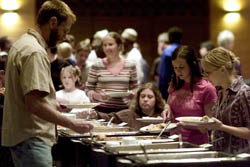Africa Night promotes unity, hope at USU
When it was all over, they danced.
The entirety of the African Student Association’s Africa Night turnout, about 75 people, took to the dance floor Saturday night in the Taggart Student Center Ballroom, after an evening of food, fashion, unity and talk of hope and of a better future for Africa.
A speech about the role the United States should play in the lives of the African students delivered by Syracuse University political science professor S.N. Sangmpam, highlighted the evening.
After giving a lecture at Utah State University Friday on the potential for an African Union, Sangmpam said he would limit the intellectual depth of his topic Saturday.
“Tonight I don’t want you to have a stomachache,” he said. “The deep thought was yesterday. Digest your food.”
Still, he did touch on several serious points.
“The United States is the world’s only superpower,” Sangmpam said to the crowd of both Africans and non-Africans. “The United States is the world supervisor.”
Sangmpam, originally from the Congo, said colonial imperialism and cold war policy had crippled African nations in the past, but the future can be better if Africans will take advantage of educational opportunities in America.
“For better, or for worse, you are here. We are here,” he said. “What we should be doing as Africans is [taking advantage] of resources that are unique, that the only superpower left in the world is able to offer us. Use the United States as a means to redevelop Africa.”
“There’s really no reason for students to come here if they didn’t think they could contribute to African society,” Sangmpam said. “They have to take advantage of what a place like this offers them.”
But education alone isn’t enough, he said.
“Technical knowledge is not enough. It needs to be applied within a context. So the second thing that African students need to do hear is open their intellect, to think seriously about what kind of Africa they would like to have,” Sangmpam said.
Comparing the United States to a parental unit short on time and looking to delegate responsibilities to a baby-sitter, Sangmpam asked the audience “Who are the guardians?”
“Because Africans happen to know their own people, their own continent, it seems to me that they are highly qualified to be good baby-sitters – great guardians,” he said.
Following Sangmpam’s address, Michael Addo, a USU graduate student from Ghana, and Evonnie Mnyandu, the AFSA secretary, performed a traditional African dance for the audience.
As the first major attempt at organizing an event by the AFSA, Mnyandu said she thought Africa Night was a success.
“We had a good turnout,” Mnyandu said. “We wanted to promote togetherness and unity, while also showing that to other students. We were actually pretty excited about the turnout of students who came who aren’t African.”
Mnyandu said creating awareness of African culture among non-African students is one of the association’s top priorities.
“A lot of people don’t know how many different African cultures are on campus, let alone that they are different,” she said. “South African culture is a lot different than the culture in Ghana or Cameroon. It’s important for people to know that Africa isn’t a country. It’s a continent full of countries.”
Jim Shoemaker, a Logan resident, said he and his two children (Matt 8, Annie 6) attended, despite lacking significant ties with the African community because of the cultural value of the event.
“I’ve been to the Indian activities before,” Shoemaker said. “But I’ve never been to [Africa Night]. It’s just a good opportunity to give the kids a cultural experience.”
After Addo and Mnyandu’s performance, Shyam Kumar, a member of the Indian Student Association, performed a Hindi song from a Bollywood film. The song was about the future of India resting in the hands of the newer generations – mirroring the theme of progress in Sangmpam’s speech.
Traditional African clothing was then put on display. Ranging from Ghana to South Africa, AFSA student’s modeled formal, religious and wedding attire from several countries.
Those in attendance also experienced samples of African cuisine. Prepared by AFSA members and their families, Cameroon cabbage, Congolese fried rice, spicy couscous, chicken curry, enjera (wrap), yesiga alich’a (beef stew) and fried plantains were served buffet style.
Another objective of the Association, AFSA President Romulus Okwany said, is to provide a forum for African students to share experiences and culture.
“We need to remember that we come from somewhere and we need to maintain our culture, because that’s where our strength actually lies,” Okwany said. “For us, it’s really important. In Africa we are close. If you talk about family in an African context, you’re not just talking about a father and a mother. It’s really up to the fourth generation.”
Okwany said some African families would be larger than the number of people gathered at Africa Night.
“If we’re back home, our family will be more than the group we have in here,” he said. “That’s the kind of thing we try to imitate here.”
At the end of the evening, Addo and Mnyandu’s husband, Phiwokuhle Mnyandu, teamed up for one final dance performance. During the routine Addo made his way, stage right, to the microphone.
“Everybody to the dance floor,” Addo said.
-acf@cc.usu.edu

Guests line up to dish up African deliacies such as Cameroon cabbage, congolese fried rice, chicken curry, and fried plantains. (Photo by Michael Sharp)

